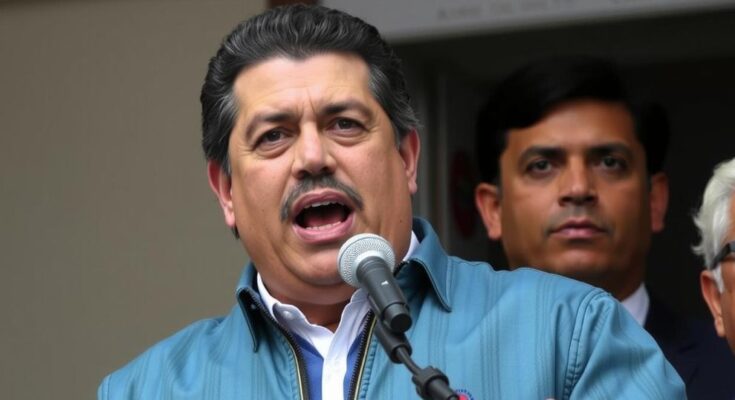Nicolás Maduro was sworn in for a third term as Venezuela’s president amid allegations of election fraud and significant protests. The opposition claims evidence shows that his main rival, Edmundo González, won the election. Maduro accused opponents of attempting to destabilize his inauguration while international sanctions against his administration intensified following widespread condemnation of electoral practices.
On January 21, 2024, Venezuelan President Nicolás Maduro was sworn in for a controversial third six-year term, marking a continuation of his presidency until 2031 amidst widespread allegations of electoral malpractice and vocal protests. Authorities secured the legislative palace, where his inauguration took place, with numerous law enforcement officials. Supporters adorned in pro-Maduro shirts celebrated outside, while demonstrations against his rule surged, led primarily by opposition figures denouncing the legitimacy of his victory.
During his address, Maduro accused the opposition of attempting to destabilize his inauguration and attributed the opposition’s failures to external interference, claiming victory for maintaining peace. His opponents, however, maintained that they possessed overwhelming evidence demonstrating that they were the true victors of the July 28 election. Independent observers confirmed the authenticity of the voting tallies put forth by the opposition, further contesting Maduro’s claims of popular support.
Compounding the unrest, the European Union and the U.S. Treasury Department imposed new sanctions on Venezuelan officials as condemnation of political repression escalated internationally. A key figure, María Corina Machado, faced detainment by security forces while rallying citizens in opposition to Maduro, a development met with international outcry, including a statement of solidarity by U.S. President-elect Donald Trump. Despite claims dismissing her detention, the situation reflects the ongoing strife within Venezuela’s political landscape.
The aftermath of the disputed election results has left the nation embroiled in turmoil, with authorities receiving significant backlash for failing to guarantee a transparent electoral process. Maduro’s administration has faced accusations of silencing dissent through force, as evidenced by the widespread arrest and reported torture of protesters. Amidst this chaos, Maduro’s supporters expressed their joy at his swearing-in, illustrating the deeply divided sentiments present within the country.
The current political situation in Venezuela has been precarious, characterized by allegations of electoral fraud and a diminishing democratic process. Nicolás Maduro has been at the center of these controversies, having served as president since 2013. The most recent electoral dispute arose from the July 28 election, wherein substantial evidence suggested that Maduro’s main opponent, Edmundo González, won by a considerable margin. As civil unrest grows and international condemnation rises, the legitimacy of Maduro’s administration remains under scrutiny.
Nicolás Maduro’s recent swearing-in for a third term exemplifies the ongoing political crisis in Venezuela, highlighted by allegations of fraud and repression. Both domestic unrest and international backlash signify widespread discontent with his governance. The detainment of opposition figures, such as María Corina Machado, further illustrates the challenges to democratic processes, raising urgent questions about the future of political stability in Venezuela under Maduro’s reign.
Original Source: gvwire.com




